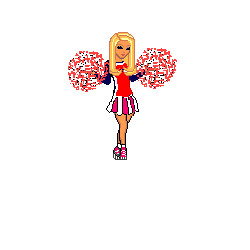"End on a Good One!"
I *loved* cheerleading. I loved the choreography, the energy, the teamwork, the Friday night lights, the competitions, and the stunting.
When I was in college, I was a flyer on my squad and I loved every second. However, there were moments were certain stunts scared me. I didn't think I had the right timing, the right skill, or the right strength to test out new tosses.
My coaches were always so encouraging. They prepped me by helping me to scaffold my skills (did any other flyers practice their one-legged stunts on cinderblocks or park benches?) and built stunt up progressions over time with my stunt groups. Even with the scaffolding and the progressions, I of course was not able to stick all my stunts.
There were moments that I had some nasty falls. There were moments that led teammates to black eyes or bloody noses. There were moments were I went to the ER for an injury- a tear, an x-ray, a brace, or a shiny new pair of crutches.
What I remember most is the times where I would work so hard for a particular stunt but couldn't quite hit it. I would royally mess up the stunt with a bad judge of timing or the poor placement of my foot, and the stunt wouldn't stick. My teammates were doing everything right, but I couldn't get my head right. I would get so frustrated and down on myself, especially if time had gone by and practice was almost over. One thing each coach always said was to "end on a good one." This meant even if I had to do a progression down (like an "easier" stunt for example), we had to end on a good one.
I would leave practice feeling more confident, because I'd at least be able to hit that one. It also reminded me that I could eventually get the new stunt or new skill- after all, I was able to get the hang of that one skill, right?
I think about these moments often in teaching. Sometimes in class, we have students who are growing to that frustration level. Students who are ready to call it quits, and class is almost over. They're likely to carry that frustration into their next class period, and it has the potential to affect the rest of their day. It has the potential to impact how they see themselves in that particular subject area, even if they've been successful in that class previously.
How can we take notice of the frustration level, pause, and help our students "end on a good one?"





Comments
Post a Comment